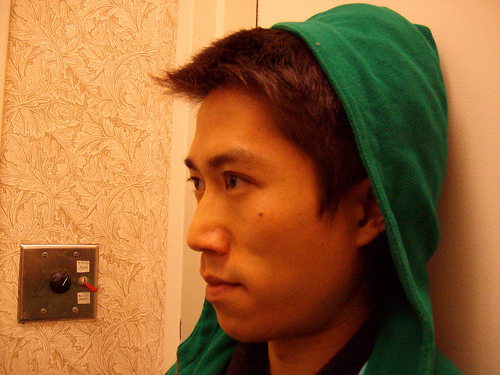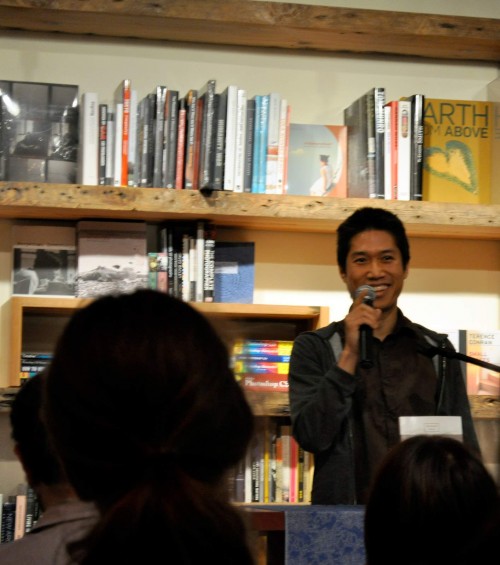Theory of Prose & better writing (ctd): The New Sincerity, Tao Lin, & “differential perceptions”
In the first post in this series, I outlined Viktor Shklovsky’s fundamental concepts of device (priem) and defamiliarization (ostranenie) as presented in the first chapter of Theory of Prose, “Art as Device.” This time around, I’d like to look at the start of Chapter 2 and try applying it to contemporary writing (specifically to the New Sincerity). As before, I’m proposing that one can actually use the principles of Russian Formalism to become a better writer and a better critic.
Long Ass Interview w/ Tao Lin pt 1 of 2

[Hi, this is Stephen Tully Dierks. I interviewed Tao Lin re his second novel, Richard Yates.]
STEPHEN: Potentially, every aspect of this novel unsettles one’s preconceived notions, from the use of title to character names to the treatment of charged themes (statutory rape, child abuse, etc.) to the notion of fiction versus non-fiction. Did you make a conscious effort to do these things, and did you have a goal or desired effect in mind?
TAO LIN: I focused, if anything, on not doing anything—or, rather, on not doing anything “extra” (the prose style, tone, perspective, focus, content of Richard Yates probably will, either as a side-effect of the aforementioned or the current “cultural climate” or the amount of preconception of the specific person reading the book, cause some preconceived notions to be unsettled, but I think any book that exists will unsettle preconceived notions, depending on who is reading it)—that I would perceive as “attempting to unsettle preconceived notions,” I think, by avoiding the defense or support of any of the characters’ behaviors, except that which the characters sometimes expressed naturally, within the narrative.
I didn’t include sentences conveying that in different contexts—for example [various cultures/subcultures over the past few thousand years]—a 22-year-old having sex with a 16-year-old, a person killing oneself, or someone vomiting food would not be notable. I didn’t want to attempt to include anything like that for any of the possibly “controversial” topics.
It doesn’t seem taboo to the “literary mainstream” of America, at this moment, to write about confusion, depression, meaninglessness, or uncertainty, and those are the things I feel focused on in Richard Yates, in my view.
What was the writing process like for this book? What is the history of its composition?
I wrote a short story in an early version of the final “prose style” of Richard Yates ~February/March 2006. Different drafts of that short story are published on bear parade and in an issue of Noon. That story is, to a large degree, about the character referenced in Richard Yates as “headbutt girl,” and I think I originally wanted Richard Yates to include maybe 3000 to 5000 words before where Richard Yates currently begins. I began writing things that are in Richard Yates, in different form, ~June/July 2006. I worked on it “idly” (maybe 1-6 hours 70-80% of days) until ~March 2008 when I worked on it “pretty hard” (maybe 2-6 hours 90-95% of days), until ~August 2008 when I sold shares in its royalties, gaining $12,000, and stopped working at my restaurant job, and worked on Richard Yates “very hard,” 6-12 hours ~98% of days, until ~October 2008. I felt it was finished. I emailed it to my publisher. They read it and said some things about it. ~December 2009 I worked on it 6-12 hours a day ~15 consecutive days. I felt it was finished. I emailed it to my publisher. They felt it was finished. ~February 2009 I asked them if I could work on it again. They said I could. I worked on it 6-12 hours a day ~25 consecutive days. I felt it was finished. ~November 2009 I worked on it 6-12 hours a day ~20 consecutive days. I felt it was finished. ~February 2010 I worked on it 6-12 hours a day ~20 consecutive days. I felt it was finished. Galleys were printed June 2010. I asked if I could work on it again. They said I could. I worked on it ~50 hours in a ~80 hour time period. I emailed it to my publisher. There were a few more emails where I changed 4-10 more non-typo things. The final draft was completed July 6 2010. A few more changes were made July 9 2010 to the PDF of the final draft.
October 12th, 2010 / 12:08 pm
Well played, Tao.

Included in this issue is an article about Tao Lin by Tao Lin. I’ll update this post with a link when it is live. Or, if you’re the sort of person who might want to do something like this, you could just go ahead to The Stranger’s website and hit refresh for the next few hours.
UPDATE:
You Are Sort of There: The “Richard Yates” Launch at BookCourt, 9/9/10
September 10th, 2010 / 10:57 am
Richard Yates Contest
Tao Lin’s Richard Yates contest, encouraging entries of video or chats about his forthcoming novel, ends tomorrow. Alongside this, Tao has offered to give away copies of Richard Yates to the first 5 people who comment here with 200+ words about one of the people appearing in one of the video entries so far (below). Comment with your email included so prizes can be received. Also, entries to Tao’s contest, with cash prizes and such, remains open until 10 PM Eastern Tuesday.
Video 1
Video 2
Video 3
Tao Lin Tao Lin Tao Lin Tao Lin Richard Yates Richard Yates Richard Yates Richard Yates
 I’m baffled by the back cover of my Richard Yates galley. The relationship between the book’s two main characters–one, the Tao figure, 22, and the other 16–is described three times, in three separate paragraphs, as “illicit,” a heavy-handed enforcement of theme which should hold truck with the novel itself: one would expect, going in, that the scandal which supposedly holds the weight of the novel would actually sustain itself as a scandal. Which happens to be so little the case that it’s kind of funny, this negation of the back cover, and is a fascinating, if unintentional, way of diverting expectations: by Richard Yates failing totally in self-description.
I’m baffled by the back cover of my Richard Yates galley. The relationship between the book’s two main characters–one, the Tao figure, 22, and the other 16–is described three times, in three separate paragraphs, as “illicit,” a heavy-handed enforcement of theme which should hold truck with the novel itself: one would expect, going in, that the scandal which supposedly holds the weight of the novel would actually sustain itself as a scandal. Which happens to be so little the case that it’s kind of funny, this negation of the back cover, and is a fascinating, if unintentional, way of diverting expectations: by Richard Yates failing totally in self-description.
July 5th, 2010 / 8:06 am
Easter Post

Richard Yates, The Easter Parade (with a link to Tolstoy’s The Resurrection)
A Better Resurrection by Syliva Plath
I have no wit, I have no words, no tears;
My heart within me like a stone
Is numbed too much for hopes or fears;
Look right, look left, I dwell alone;
A lift mine eyes, but dimmed with grief
No everlasting hills I see;
My life is like the falling leaf;
O Jesus, quicken me.
And from The Holy Gospel of Jesus Christ according to St. John, chapter 20, verses 24-31, from the Douay-Rheims New Testament (thanks Barry, for suggesting this version of the New Testament): READ MORE >
Richard Yates Reads a Story

I found this while poking around the discussion below. Alicia, who is putting up a good fight in the comments section for Narrative Magazine, has linked on her blog to an audio recording of Richard Yates reading “The Best of Everything.”
If you’re tired of reading about Narrative, take thirty minutes to listen to Yates.
Thanks, Alicia.
Types of novel: Cult, or coterie, novels

April and Frank's trip to Paris
Kate Winslet won an Oscar for The Reader, but Richard Yates fans everywhere thought to themselves, I’m just going to pretend she won this for her portrayal of an American housewife instead of an illiterate fräulein.
So, the movie wasn’t exactly fantastic. You, and every other literature major undergrad, film critic over the age of 45 (new yorker review cough cough) were willing to forgive the movie for it’s, shall we say, defects. Obviously you could look past the “limitations of the medium” because Yates finally got the recognition he deserved! This is obviously a year of triumph for underdogs. Obama is president, Kate Winslet WINS an Oscar, Richard Yates’ magnum opus is turned into a film and nominated for three Academy Awards. Woo, hoo!
This recognition is not without its drawbacks, and clearly you wouldn’t be a Yates fan if you didn’t get all hot and bothered by life’s bittersweet moments. In the aftermath of a booze soaked celebration you awake a little less certain about the cultural capital of your precious dog-eared copy of Revolutionary Road.
It’s not long before your shadowy unease grows to proportions of nightmarish beast. Shortly after you mom visits you for the weekend and steals your beloved 12th edition paperback, the horrific truth dawns on you; the cult classic value of your blue chip investment has plummeted, you are now culturally bankrupt.



